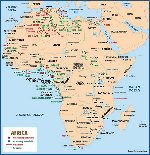Africa: Nigeria
August 2000 Vol. 221 No. 8 International Outlook AFRICA Nigeria Fires, riots, ethnic massacres, bombings, protests, declarations of force majeur
AFRICANigeriaFires, riots, ethnic massacres, bombings, protests, declarations of force majeure, kidnappings, murders, production shut-ins, union strikes – just another year of turmoil in Nigeria. Yet, ironically, one could say that it has been a year of optimism and positive change as the country returns to democracy. Nigeria’s new president, Olusegun Obasanjo, is reforming the country’s oil sector. He replaced the entire military command, canceled 47 E&P contracts handed out by his predecessors, intends to privatize the country’s refineries and plans to sell some unprofitable state-owned businesses. Jackson Gaius-Obaseki, director of the Nigerian National Petroleum Corp. (NNPC), fired more than 70 senior and mid-level managers, stopped the theft of gasoline for the black market, revised oil-trading contracts and conducted several audits.
According to an article in Platt’s Oilgram News, the Clinton administration wants to lessen U.S. crude-supply dependency away from the Persian Gulf – apparently toward Africa – as evidenced by recent visits to Nigeria by Energy Secretary Bill Richardson. Richardson signed an MOU pledging short-term financial support for the oil-rich nation’s energy sector in exchange for "substantial free-market reforms, beginning privatization of state energy companies, and removing trade and investment barriers." The U.S. buys about one-third of Nigeria’s crude. Agip, Chevron, Shell, Mobil, TotalFinaElf and Texaco, collectively, have 98% of the country’s operating assets and oil reserves. Oil and gas account for 95% of Nigeria’s export revenues. Exploration. By the cut-off date of July 1, 2000, 51 bids were submitted for 22 new onshore and offshore licenses that were put up for auction in March. Ocean Energy and Nigerian partner Amni International submitted the highest bid: $201 million. Shell offered $200 million for the combined OPL 250 and OPL 332 blocks. Winners will be announced later this year. Discovery Well AKPO 1 flowed 9,000 bopd last May. The well was drilled in 4,500-ft waters in OPL 246. TotalFinaElf is operator (24% interest) with partners South Atlantic Petroleum (60%) and Braspetro (16%). Texaco’s Agbami 2, the second well drilled in the deepwater Agbami structure, suggests a giant field of 1 billion boe or more. The structure covers 45,000 acres. Texaco plans to drill two more appraisals on the field this year. The company will also drill a wildcat on each of the five deepwater blocks it holds an interest in. Four major deepwater discoveries have now been made offshore Nigeria. Drilling/development. Continuing unrest among communities in the Niger Delta and other groups – who are demanding a larger share of oil revenues – is impeding development, especially onshore. Shell will spend $2.7 billion to develop its deepwater Bonga field. The giant field is in 3,300-ft waters and is expected onstream in 2003, producing 200,000 bopd and 150 MMcfgd via subsea completions to an FPSO. Reserves are estimated at 600 million bbl. Nigeria flares about 75% of its gas production, but a six-company, Chevron-led consortium will change that when it builds the $400-million West African Gas Pipeline. It should start delivering 120 MMcfgd to Ghana, Benin and Togo beginning in 2003. The government signed a $1-billion agreement in November for development of EA/EJA field with Shell (77.14%), Agip and TotalFinaElf. With reserves of 350 million bbl, the shallow-water field should produce 100,000 bopd and 100 MMcfgd. It is expected to come online later this year. Production. The country plans to expand production capacity from the current 2 million bopd. Capacity should expand to 3 million bopd by 2003 and 5 million by 2010. The government will invest $35 billion in the energy sector during the next five years. Nigerian LNG Co. made its first shipment of LNG from the $3.8-billion LNG plant in Bonny, Rivers state, in October. Construction of a third LNG train is 30% complete and should be online by year-end 2002. Ireland’s Tuskar Resources sold its first oil from Obe field in February. While in an extended-test phase, Well Obe 4’s flowrate was more than 5,500 bopd. An FPSO will soon be repositioned and anchored for further production. Reserves are estimated to be 500 million bbl. Nigeria’s crude and condensate production averaged 2.1 million bpd in
1999. Annual gas production was 200 Bcf.
|
- Applying ultra-deep LWD resistivity technology successfully in a SAGD operation (May 2019)
- Adoption of wireless intelligent completions advances (May 2019)
- Majors double down as takeaway crunch eases (April 2019)
- What’s new in well logging and formation evaluation (April 2019)
- Qualification of a 20,000-psi subsea BOP: A collaborative approach (February 2019)
- ConocoPhillips’ Greg Leveille sees rapid trajectory of technical advancement continuing (February 2019)



